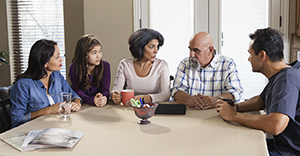Brain Tumors: Emotional Issues
A diagnosis of cancer anywhere in your body can affect your emotions and feelings. A brain tumor can directly affect the brain and cause emotional and personality changes. Tumors can cause different kinds of personality changes. It depends on what part of the brain is affected. Treatments for brain tumors, such as surgery and radiation, may directly affect personality and emotions.
Dealing with emotions
-
Realize that everyone responds differently to diagnosis and treatment.
-
Accept that you may cope better some days than others.
-
Take time to absorb what you know before you discuss it with others.
-
It's normal to feel some anger, stress, and even depression. Try not to take your emotions out on the people you care about.
-
Think about going for talk therapy (counseling). It can help you cope with the demands of cancer and cancer treatment.
-
Talk with your doctor about medicines or other types of treatment that might be helpful.
-
Learn what you can about stress reduction methods from family, friends, and your care team.
-
Think about speaking with your spiritual or religious leader.
-
Find a local or online support group.
Adjusting to daily life
-
Say “yes” when people offer to help, such as with cooking and housework.
-
Arrange for childcare when you need a break.
-
Think about a healthy eating plan and healthy lifestyle choices.
-
Talk with your doctor about a walking or exercise program.
-
If you’ve been told not to drive at this time, get help setting up rides. Talk with your social worker, case manager, or discharge planner.
-
If your schedule is too tiring, ask your employer if you can cut back your work hours. Or, if allowed, try working from home, where you can pace yourself.
Talking with your family and friends
It may be hard to talk about your brain tumor and its treatment. But you may also want to let family and friends know what you are going through.
-
Let them know that there's no one right thing to say. Assure them that showing they care is helpful.
-
Expect people to respond in different ways. Some may seem angry. Others may seem too upbeat, saying everything will be fine. Know that they all mean well.
-
Don’t overwhelm children. Explain what’s happening in a way that they can understand. When children sense that something is going on but it hasn’t been explained, they may blame themselves.
Remember that some of the medicines you take may also cause emotional issues that can affect your outlook on life. For instance, steroids can cause depression and irritability. You may want to talk with your loved ones about these possible mood effects.
 |
| Talk with your loved ones about how they can help. |
Notes to family and friends
-
Sharing feelings and listening will help keep your loved one from feeling alone.
-
Your loved one may feel guilty for relying on you so much. Offer to help when you can and arrange for others to be there when you can’t.
-
Learn what you can about treatment for brain tumors.
-
Take time for yourself. You will be more of a help if you take time to rest. Take care of yourself, and keep up with the needs of your own life.
-
Think about writing in a journal.
-
Consider joining an in-person or online support group for caregivers.
© 2000-2025 The StayWell Company, LLC. All rights reserved. This information is not intended as a substitute for professional medical care. Always follow your healthcare professional's instructions.